This, if you’re reading the physical paper – which, of course, you are not – is my last edition as editor. In just over 20 years we have put nearly 7,500 papers “to bed”, as almost no one says nowadays. At some point in the 24-hour, seamlessly rolling digital news cycle, you’ll have a new editor. I will have slipped away and my successor, Katharine Viner, will have materialised at the helm.
Since 1821 there have been just 10 editors of the Guardian – or 11 if you count Russell Scott Taylor, the 18-year-old who helped edit for a brief period in the 1840s. The greatest of them, CP Scott, managed 57 years in the hot seat. His son, Ted, drowned on Windermere only three years into his stint. Twenty years is, give or take, about the average.
The paper I joined in 1979 felt in some ways like a family firm, and in a sense, it still is. I started on the same July Monday as Nick Davies, who went on to become one of the finest reporters of his generation. His career led him into investigations, mine initially into descriptive reporting, columns and features. From the day I arrived, the Guardian felt like a warm bath – a place of sanctuary for free thought and writing.
And I was very firmly a writer: it never occurred to me that I would ever edit any bit of the Guardian, let alone be let loose on the whole thing. I even left at one point, to take my writing elsewhere. But in late 1988 the Guardian badly needed a Weekend magazine to answer the rather brilliant Saturday glossy that had just been launched by the Independent. For some reason, Peter Preston, the Guardian’s then editor, asked me to do it.
I had been diverted down a different journalistic path – one that would lead me, via the launch of G2 in 1992, to take over the editor’s chair on 13 January 1995. I knew enough of the Guardian’s history to feel utterly overawed by the responsibility. Please, please let me not drop the vase.
But, of course, the Guardian is much bigger than any one editor. A rival kindly took me out to lunch soon after I started and reassured me: “If I take a day off, there are six assistant editors who have a completely different view of what my paper should be. If you take the day off, the building itself would produce the Guardian.”
He was right. There is – through a combination of cultural osmosis, ownership and watchful readers – an incredibly strong shared idea of what the Guardian is, even if the job is to reinterpret it for each generation, “in the same spirit as heretofore”.
My first edition appeared the following day, as if nothing had happened, with the splash headline: “EU moves to tighten frontiers”. Plus ca change.
During the first 170-odd years of the Guardian’s life there were, of course, enormous challenges and changes, not least the transformative decision to move from Manchester to London in 1964. But the essentials of newspaper life were the same in 1995, when I took over from Peter Preston, as they had been in 1821, when the paper was launched in response to the Peterloo Massacre of 1819.
Stories were told in words and (more recently) pictures – still black and white, the “proper” medium for news 20 years ago. The rhythm of the day built up to one main deadline, around 9.30pm. We knew the cost of paper, ink, printing and distribution, and could flex the price of advertising, and of the newspaper itself. The readership was overwhelmingly in the UK, and if they ever wanted to get in touch, they did so by phone or letter. It was a world of known knowns.
Twenty years later, we swim in unknown unknowns. We still tell stories in text and pictures, but the words are as likely to be in the form of live blogs as stories. We have learned to use moving pictures as well as stills. We work in audio, interactives, data, graphics and any combination of the above. We distribute our journalism across multiple channels, platforms and devices, including live discussion and debate. We’re on the iWatch; we’re in bed with Facebook; we’re still in the corner shop.
Two thirds of our readership is now outside of the UK: we publish continuously. Virtually all our readers can themselves now be publishers and can connect with one another, and anyone else, as well as us. They contribute to the Guardian in ways that were unimaginable even 15 years ago.
On top of all that, we still produce a newspaper. Or, more precisely, two. The Observer, 30 years older than the Guardian, is in really good health under John Mulholland.
The economic model of what we now do is still in its infancy. Twenty years ago, no one asked a newspaper editor about their business model. Now it’s one of the first questions. And, of course, the Guardian – though extremely financially secure today compared with many periods in its past – is no more immune than any of its rivals to the need to find a sustainable basis for what it does.
Some publishers have decided to erect walls around their digital content and insist on payment. The polar opposites are represented by the Guardian and the Times of London, the latter of which today claims a daily digital audience of around 281,000. In April the Guardian was read by more than 7 million unique browsers a day. On an equal accounting basis, we’re losing (or investing) about the same amount of money. You’ll have to come back in 10 or even 20 years time to find out who judged the future best. But the Guardian – still the eighth-biggest newspaper in the UK – is now vying with the New York Times for the mantle of largest serious English-language newspaper website in the world.
Libel and a life online
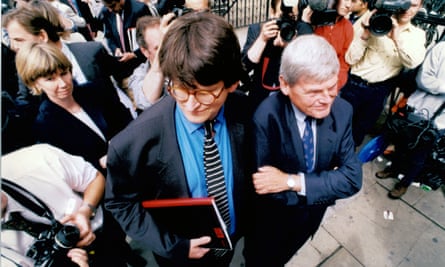
So much for the numbers. While sorting through 20 years’ worth of assorted papers in recent weeks – I’m a hoarder rather than a chucker – I made mental divisions for the past two decades. First came the Libel Years, during which it felt as if the Guardian was never out of one court or another. Almost as soon as I took over, there was a procession of MPs, cabinet ministers, lobbyists, cult-busters, quack doctors, corporations, police officers, banks and rich playboys queuing up to injunct or sue us.
There is – thank goodness – much less libel around these days, but those battles were often epic, costly and immensely time-consuming. If you won – which, mostly, we did – they could even be fun. Mostly, they were nerve-racking and exhausting. I’m not sorry to see the slow decline of the London libel industry, and hope that we, alongside other newspapers and free-speech organisations, played a small part in helping to finish it off. And a big thank you to all m’learned friends from over the years. You were expensive. But good.
Then came the first Internet Years, during which – under Ian Katz’s leadership – we created a website that didn’t fall into the trap of simply replicating online what we did in print. Ian and his team saw early on that this was a medium that was, in many important respects, quite different from print, and created a digital Guardian Unlimited that played by the new rules of the game.
Then there was an interlude with the print Format Wars – a response to the bold move by the Independent and Times to switch from broadsheet publishing to tabloid. The Indie even announced that it would henceforth be a “viewspaper”, not a newspaper – a startling declaration of intent that got lost in the excitement about size.
For various reasons – not least the amount of classified advertising we still took in print at that point – tabloid didn’t really work for us. We needed new presses anyway – the cost of any format was neutral – and opted for the European Berliner size.
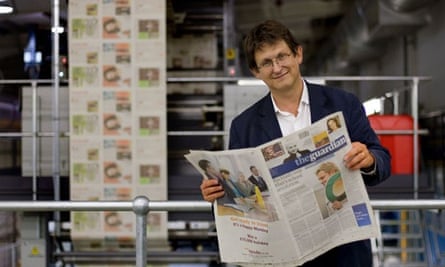
The paper that took shape in the hands of designer Mark Porter and deputy editor Paul Johnson (and, at the Observer, with former editor Roger Alton) was a thing of beauty and flexibility. But, even as we installed the new Man Roland presses, we knew they were likely to be the last we ever bought. In retrospect, it’s not clear that the changes in printed format transformed the fortunes of anyone – big, little or medium.
The next phase was the Social Web, or Web 2.0, as it was first called. Emily Bell, by then editing our digital output and our resident seer, quickly pronounced this to be as important as the web itself. There was a fork in the road, she warned us: we could fence ourselves off from this social, economic, cultural and publishing revolution, or we could embrace it wholeheartedly. Open or closed? We went for open.
An early experiment was Comment Is Free, launched by Georgina Henry in 2006 as a way of immensely broadening and diversifying the pool of Guardian commentary – not just the “above the line” writers, but the hundreds of thousands of you who flooded in to debate and argue in a way that had never previously been possible.
We had to devise new rules and conventions. A new breed of journalist – comment moderators – was born in order to handle the avalanche of opinion. We had created a new democracy of expression, which was sometimes uncomfortable, but mostly rich and absorbing, and sometimes even exhilarating. Our most recent design, overseen by our head of digital strategy Wolfgang Blau, took this journey still further.
Breaking news
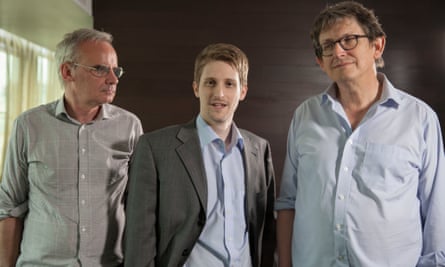
And, finally, there were the stories: about crooked bungs; politicians on the take; corporations dodging tax; toxic spills; unethical policing; lethal policing; torture and rendition; female mutilation; drugs; food production; pill-peddlers and much more.
Wikileaks, in 2010, felt, and was, enormous: the biggest leak of diplomatic and intelligence cables the world had then seen. But then came phone-hacking – Nick Davies’s extraordinary seven-year slog of reporting gradually shone a light on the crimes, evasions and deceptions of the most powerful news company in the world.
Davies’s reporting stopped a vast, ruthless media monopoly from effectively doubling in size – with all the consequences for power, democracy, regulation and even policing that went with that. The best defence that the Murdochs – son, father and associates – could muster was that it was out of control. Any other response would have been too corporately apocalyptic to contemplate.
British journalism as an occasionally thoughtless bloodsport has as a result, I think, been checked a little, though I know not all my fellow editors either agree or approve.
And then came Edward Snowden, with his astonishing insights into the way the surveillance business had been industrialised since 9/11, so that – without any kind of meaningful informed consent - countless millions of people the world over have had their data scooped up, stored and analysed.
Judges, congressmen, lawyers, presidents, legislators, internet giants and academics around the world pored over the Guardian stories, so surely edited by US editor Janine Gibson. Only this month the US phone dragnet that had secretly violated the privacy of millions of Americans every day since October 2001 was shut down. This was perhaps inevitable after the programme’s overwhelming rejection by Congress, and after a US court of appeal ruled that the bulk collection of telephone metadata revealed by Snowden was unlawful.
The Pulitzer prize for public service was our reward. Snowden, who made the kind of sacrifice most of us would find hard even to contemplate, must, alas, wait for his own form of absolution and just recognition.
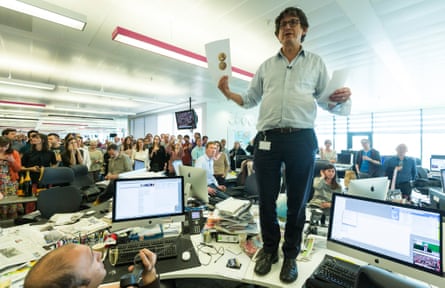
There have been other recent successes – deputy editor Katharine Viner’s brilliant launch of Guardian Australia – as part of our international expansion; Rob Evans’s long, dogged campaign to drag Prince Charles’s political correspondence into the open; our recent campaign to treat climate change with the gravity and impact it deserves; Maggie O’Kane’s forceful crusade against female genital mutilation … and much more.
Independent in perpetuity
As I’ve cleared my shelves and sorted through fading ephemera, I have, of course, reflected on what the Guardian is – and what it is to be an editor.
When John Scott, one of the sons of CP, decided to place the Manchester Guardian into a trust, he consulted Churchill’s future lord chancellor, Gavin Simonds, who told him: “It seems to me that you are trying to do something very repugnant to the law of England. You are trying to divest yourself of a property right.”
That was precisely what Scott was trying to do. Sir William Haley, later editor of the Times, said: “He could have been a rich man; he chose a spartan existence. And, when he made up his mind to divest himself of all beneficial interest [in the Guardian], he did so with as little display of emotion as if he has been solving an algebraical problem. Most men making so large a sacrifice would have exacted at least the price of an attitude.”
The decision of the Scott family to give up all financial interest in the Guardian must rank high among the great historic acts of public-minded philanthropy. In doing so, they created an ownership structure with only two purposes: to secure the future of the Guardian in perpetuity, and to protect its independence in all situations, at all costs and against all comers.
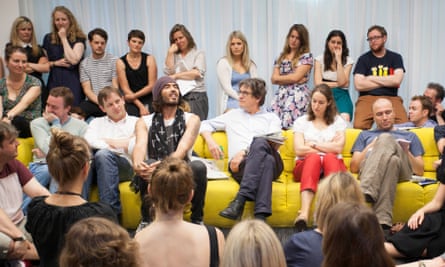
The perpetuity bit is, of course, always a work in progress – though building an endowment of around £1bn is certainly a strong foundation for the future. The role of the Guardian Media Group – the “commercial” wing of the operation – has been crucial.
The independence given to us by the trust manifests itself in a hundred ways. Before the recent general election, 200 of us sat in a room one lunchtime to decide which party, if any, to endorse. There was no message filtering down from above, explicit or implicit. Rightly, or wrongly, the decision was ours alone.
The same spirit is there every morning, when anyone on staff can come to the morning conference – to listen, to contribute, to challenge or to absorb. It was there when the insurers in the Aitken libel action urged our co-defendants, Granada TV, to surrender – while the Scott Trust told us to fight on. It was there when the state and assorted politicians came knocking to get them to pull the plug on the Snowden stories. The trust had the absolute answer: we can’t.
It was there every time this editor needed advice from those wisest of owls, Hugo Young and Liz Forgan. It’s there in the words of the centenary essay penned by Scott in 1921, in which he wrote of the balance between the material and moral existence of a newspaper – between profit and power. There was never any question for him which mattered more.
Power over profit. But even that, in a modern context, makes me a little uneasy. I end with a confession about editing, and a nagging anxiety about this business of power.
An editor, if he or she chooses, can be a very powerful figure indeed. Editors can make or break people. They dictate who gets a voice, and who remains voiceless. They can, if they want, bully and frighten whom they choose. They can impose their views on a newspaper and, through the paper, on a country and the lives of millions.
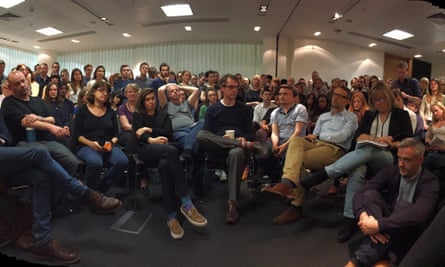
As we’ve seen, they can break the law while delving into private lives in reasonable confidence that no one will stop them, not even the police or regulator. They can have a disproportionate influence in shaping debates – if only by excluding any contrary arguments. One voice can dominate an entire newspaper, from the front page, throughout the reporting and the editorial columns to a select few allowed to be commentators.
People do still bend their knee to this kind of power, even in an age when the influence of mainstream media is supposed to be waning. In my modest fashion, I’ve experienced it at first hand. And, in a way, I’m glad of that. I want strong institutions of the fourth estate. In a world of globalised, distant, often unaccountable power, a countervailing source of scrutiny and influence is needed more than ever.
But I’ve never wanted the Guardian to be my voice – nor would my Guardian colleagues have wanted or allowed it. Scott saw clearly that a newspaper had to shun “the temptations of a monopoly … the voice of opponents no less than that of friends has a right to be heard”.
I don’t know that I’ve always lived up to Scott’s ideal in that, but it was important to me that the Guardian had, for instance, a Simon Jenkins, a Max Hastings or a Matthew d’Ancona as well as writers who swam more easily with our liberal currents.
Giving away power
The Guardian has had the strength to withstand all the attacks launched in response to our journalism during the past 20 years – and there have been many. But we drew our resilience from the power of the institution, not of any individual.
But the power of an editor has always made me nervous. Early in my editorship I gave away significant power: the power of correction. It seemed obvious to me that journalism, as an imperfect medium, will always include mistakes – and that the very last person to adjudicate on whether or not an error had been made was the person responsible for the error in the first place.
I have never forgotten this tell-it-like it is description of a newspaper by the Washington Post’s David Broder: “[A] partial, hasty, incomplete, inevitably somewhat flawed and inaccurate rendering of some of the things we have heard about in the past 24 hours – distorted, despite our best efforts to eliminate gross bias, by the very process of compression that makes it possible for you to lift it from the doorstep and read it in about an hour. If we labelled the product accurately, then we could immediately add: ‘But it’s the best we could do under the circumstances, and we will be back tomorrow, with a corrected and updated version.’”
And so, since 1997, anyone who thinks the Guardian has got something wrong can bypass the editor and appeal to someone who is himself not answerable to the editor, but to the Scott Trust. I cannot interfere in his judgments, nor edit the weekly column in which he is free to criticise the paper or expose our weaknesses.
Something like this is commonplace in American newspapers, and elsewhere, but is still not the rule in the UK. You can see why. If, as editor, you greatly savour the view from the bully pulpit, then it makes no sense at all to appoint a truly independent umpire.
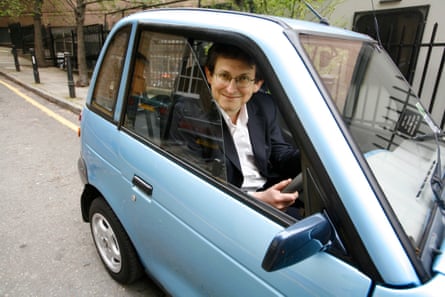
More recently, I gave away more power – creating an editorial board to oversee the comment pages and leader columns. We did not completely follow the US model, in which the executive editor of, say, the Washington Post or New York Times has no say at all over the opinion pages. I remained editor of the whole Guardian. But I did want to create a clear divide between the business of news and comment, and to give the editorial board, headed by Jonathan Freedland, the freedom (and time) to think for themselves. Of course, CP Scott famously articulated the separation in his 1921 essay. One was free, the other sacred. As usual, he was right.
Next week, for the first time in 20 years, I will have stepped off the hamster wheel of news. The Guardian is in good shape, its reach, influence and endowment bigger than anything imaginable at the time John Scott made his noble and philanthropic sacrifice.
I have been blessed with wonderful colleagues, whom I shall miss terribly – only a very few of them named here. Katharine Viner will be a wonderful 11th (or even 12th) editor of the paper. Next year I will head (as well as Lady Margaret Hall at Oxford University – founded, like the Guardian, in the cause of reform) the institution I have come to cherish beyond all other in the media: the Scott Trust itself.
I will say goodbye to colleagues in person. But please, readers, accept this as my farewell to you, along with my intense gratitude for your support, engagement, response and argument over many years. I know many of you have now become “members” of the Guardian, as we open the paper up even more to live and physical experience.
I’ve noticed that some of the most devoted readers tend to carbon-date themselves by editor. “I started with Wadsworth,” an elderly loyalist might say; or “I began reading under Hetherington.”
But, in the end, we editors just pass through. We all know that you, the readers, are the real carriers of the flame.
Twitter: @arusbridger
alan.rusbridger@theguardian.com
The Rusbridger years: a timeline
24 January 1995 Rusbridger is named editor by the Scott Trust, having won a vote of journalists, taking over from Peter Preston. He had been features editor for a year, and had launched both Weekend magazine and G2.
November 1995 Launch of Go2, the Guardian’s first internet publication – the online form of the paper’s science and technology supplement.
30 September 1996 Neil Hamilton withdraws libel action. The MP was later found guilty of asking questions in parliament in exchange for brown envelopes full of cash.
1997 The Guardian becomes the first British newspaper to create its own ombudsman, as Ian Mayes is appointed Readers’ Editor. He has a regular column handling corrections, clarifications and complaints.
20 June 1997 Jonathan Aitken withdraws libel action. Having promised to “cut out the cancer of bent and twisted journalism”, the former minister is later imprisoned for perjury.
January 1999 Launch of Guardian Unlimited, covering news, football, cricket and jobs. By September it has a million users.
12 September 2005 The Berliner is launched. The Guardian becomes the only national newspaper to publish in a new medium size, and in full colour.
14 March 2006 All opinion writing – and the discussion it starts – gets its own home online: Comment Is Free.
December 2008 The Guardian moves to Kings Place, moving 1,700 staff a short distance across north London after 32 years in Farringdon Road.
November 28 2010 Wikileaks cables are published. The Guardian is one of five newspapers worldwide to publish a selection of the US diplomatic documents leaked by Bradley (now Chelsea) Manning, a soldier who had downloaded them.
July 4 2011 Years of revelations about phone-hacking at News International culminate with evidence that the News of the World hacked the phone of murdered schoolgirl Milly Dowler. The paper closes six days later.
June 5 2013 The Guardian publishes documents leaked by Edward Snowden detailing surveillance of private information by the NSA and other bodies. The Guardian and the Washington Post win a Pulitzer prize the following year.
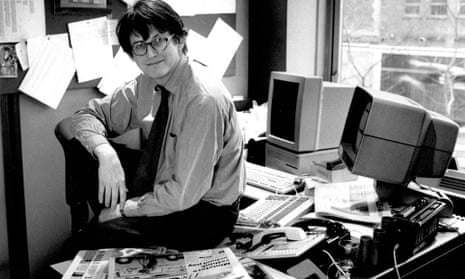



Comments (…)
Sign in or create your Guardian account to join the discussion